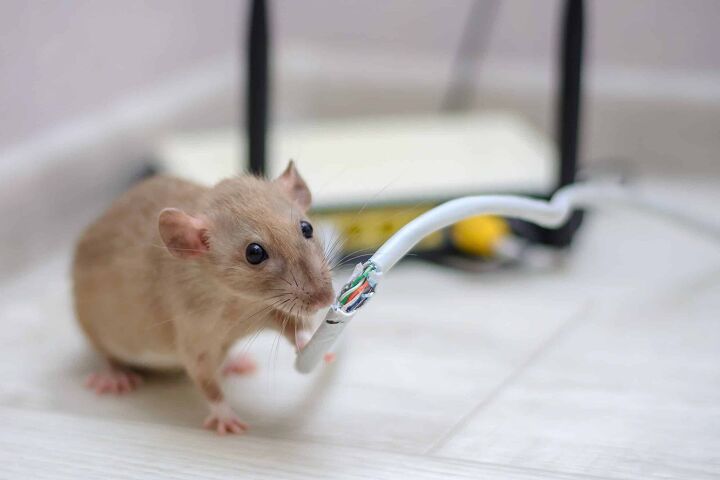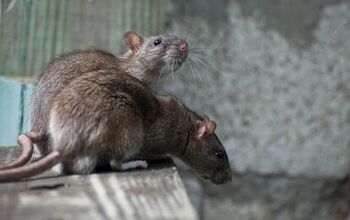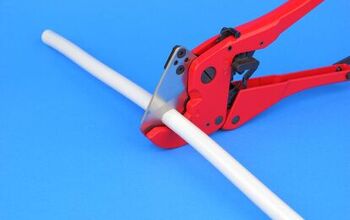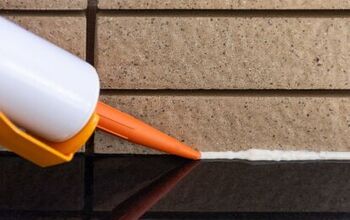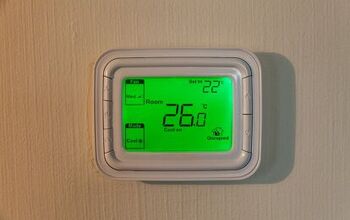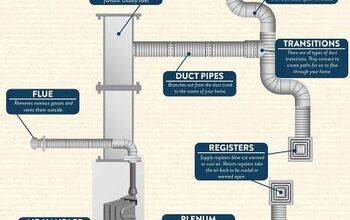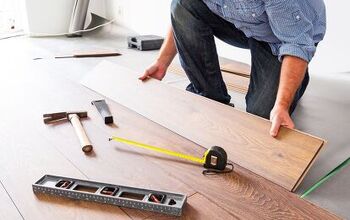Can Rats Chew Through PEX Pipe? (Find Out Now!)

Cross-linked polyethylene, also known as PEX piping, is a type of piping that is comprised of flexible plastic. Most importantly, they are beginning to replace traditional galvanized steel and copper for water supply lines in both remodels and new construction projects.
Yes, rats can, and do, chew through PEX pipe because it is malleable. Since it is malleable, rats, mice, and other rodents or animals are able to chew through it. However, they cannot chew through traditional piping because the metal is too hard for them to bite through. Metal is best to protect against rodent damage.
Do You Need Pest Control Services?
Get free, zero-commitment quotes from pro contractors near you.

What is PEX Piping?
Though we are mostly aware of galvanized steel and copper in piping, PEX is rapidly becoming a more flexible alternative. As a matter of fact, PEX is used in nearly 60 percent of all new construction water supply residential systems.
There is some debate about whether or not PEX is safe to use given that it gives off certain chemicals. In California, PEX piping is illegal. So, it certainly has its downsides for all of the positives of the increased flexibility.
Can Rats Chew Through PEX Piping?
The simple fact of the matter is that the flexible plastic comprising PEX piping is much more prone to damage from rodents. The age of the home doesn’t matter; if you have an attic space, you will need to be aware of potential rodent damage to your PEX piping.
You may hear some rustling in your attic space. If this is the case, you can have an inspection done before they find the PEX piping and start to make it their favorite snack. Any damage done to the PEX piping will have to be replaced in order for the piping to work effectively once again.
How Can You Stop Rodents from Chewing Through Your Water Pipes?
This is largely dependent on knowing that there is a rodent issue in your home. Unfortunately, there are far too many instances where we don’t know there is a rodent problem until it is too late. But if you know that there may be rodents permeating the area, there are things that you can do to prevent them from causing damage.
Keep in mind that these are mostly temporary solutions since the idea is to bring out an exterminator to get rid of the problem. If you have an infestation, it can be particularly difficult to quell the problems that they can cause.
Provide a Water Source
If this sounds counterintuitive, think about it like this: rodents are looking for a consistent source of water and food. Why would you want to provide them with these things, essentially keeping them around for longer?
Well, if you know they’re looking for a source of water, you want to divert them away from the water pipes. By creating a reliable source of water for them, you draw their attention away from the piping. If you’re using rat poison, which essentially dehydrates them, you can then move the water source out greater distances until they leave the home.
At the very worst, you can provide a water source for the rats until an exterminator is able to come out to address the problem. It might not be ideal, but you can at least prevent damage to the PEX piping, which could wind up costing you way more time and money.
Seal Off Entryways
The thing about rats and other rodents is they don’t need a ton of space to get into your home. So, if you’re wondering how they are getting into your home, there’s a chance that there is some kind of crevice or opening that you aren’t aware of.
Search the perimeters of your home and attic to find any potential openings where the rats may be coming in. Inspect the outside as well, sealing off even the smallest of openings. Remember, rats can squeeze into even the tiniest of spaces, so even something that doesn’t seem possible you should seal off just to be safe.
Don’t Use Poisons, Use Traps
If you’re hellbent on getting rid of the rat problem yourself, poison may seem like an easy, attractive option. But the better approach may be to use traps instead. Poisons work by effectively dehydrating the rats until they either leave the area in search of water or simply die.
With a trap, it will catch and kill the rodent straightaway. You can even provide them with an easily accessible source of water to draw them into the traps. The goal is to keep them from going near the PEX piping, where they can chew away and cause damage.
Consider Natural Rat Repellants
Whether you prefer a more humane way to keep rats from chewing your pipes or you’re concerned about your children or pets getting into your mouse traps, there are a number of natural repellent solutions to choose from. These are as follows:
- Peppermint oil is, arguably, one of the most commonly used natural rodent repellents out there. Although there are a couple types of essential oils that may work, peppermint oil tends to be the most widely known. Rodents, like rats and mice, despise the smell of peppermint, as it irritates their nasal passages. Simply put a couple drops of peppermint oil onto cotton balls and strategically place them in areas of your home that the rats frequent. You can also make a 2:1 solution (two cups oil to one cup water) and spray it throughout your home.
- Mothballs do more than just deter moths, they have also been known to keep rats and mice away. They contain a substance known as naphthalene, repels rodents when used in high doses. Since mothballs have a low dose of this substance, you’ll want to use quite a few. Though, make sure to keep them away from your children and pets.
- Ammonia mimics the smell of predators’ urine and can, therefore, be very effective as a rat repellent. Out of fear of being eaten, they will avoid any areas that contain this scent. So, consider putting a few drops of ammonia where the rats are nesting. Avoid using too much, as the scent can then become harmful for both pets and humans.
- Steel wool can be used to block entry points. It is also affordably priced in bulk and easily attainable at most grocery stores and home improvement centers.
- Cayenne pepper, cloves, camphor, and even tabasco sauce also have very strong scents that many suggest make wonderful natural rodent repellents.
Other Dangers That Rats Pose
Chewing through your water line is bad enough. It can cost you an arm and a leg to get the piping repaired or replaced. But did you know that it is far from the only thing that they can chew through that can cause serious damage to your home? A rat infestation is a serious issue that needs to be addressed as soon as you become aware.
Causing a Fire
But wait, rats don’t know how to use matches, do they? Unfortunately, they don’t have to. They have a tendency to chew through the electrical wiring in your home, even going through lead pipes and bricks to get there.
Because rats like to spend a fair amount of time in the attic – where heat rises, creating a warm, cozy environment – there is a chance that they could chew on any electrical cables that may be laying within. If the wiring is near any beams or insulation, a fire can start. At the very least, you’re looking at fire damage. If no one is home, you could find the house burnt down.
Structural Damage
Rats can also cause major structural damage. This is in part because they need to constantly chew on things to keep their teeth from growing out of control. Because of this need to control their teeth, they will chew on just about anything.
The result? Serious structural damage. They have been known to cause billions and billions in structural damage to urban environments on a yearly basis. Simply put, they gnaw through the wood framing of a home. That can include headers, studs, floor joists, and even roof trusses.
Even worse, they aren’t just targeting wood. They can even chew through drywall and concrete, too. Whatever they want to chew on, they can and will. This shouldn’t pose a real danger to you, but it can lead to major structural damage that needs repairing.
Do You Need Pest Control Services?
Get free, zero-commitment quotes from pro contractors near you.

Can Rats Chew Through Copper Piping?
Because copper is a weak metal, it doesn’t stand a chance when met by the sharp teeth of a rat. So, if you think that the simple solution to protecting your waterline is to use copper instead of PEX piping, think again.
When rats decide to chew on an area, there is little standing in their way. So, if you may have rats in your home but have copper piping, don’t get too confident. Rats can chew through the copper, causing leaks and other major issues. You could be staring down major structural damage if those leaks are allowed to persist for very long. That can mean serious damage that needs to be repaired in short order.

Ryan Womeldorf has more than a decade of experience writing. He loves to blog about construction, plumbing, and other home topics. Ryan also loves hockey and a lifelong Buffalo sports fan.
More by Ryan Womeldorf



